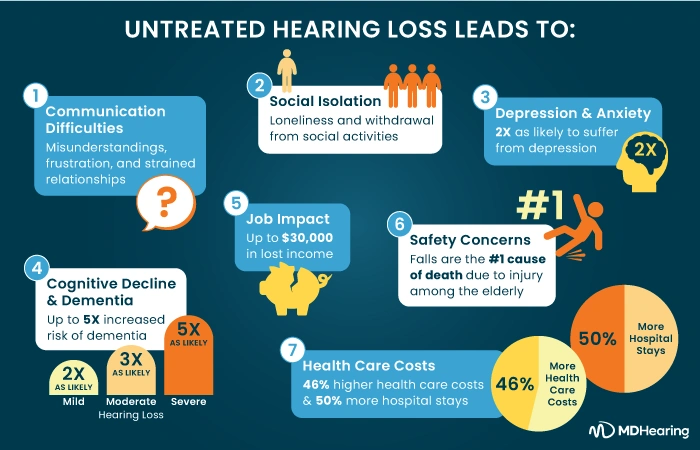In a world dominated by the noise of daily life, hearing plays a pivotal role in connecting us to our surroundings and each other. Yet, the silent epidemic of hearing loss often goes unnoticed, and its consequences are underestimated.
Approximately 48 million Americans have hearing loss, but fewer than one in three use hearing aids to treat their hearing loss. This figure is disconcerting when you consider the many health and financial dangers of hearing loss.
In this article, we aim to shed light on the various profound effects of untreated hearing loss, and hopefully inspire you to seek medical attention at the first sign of hearing decline.
1. Communication Difficulties
One of the most immediate and noticeable consequences of untreated hearing loss is the difficulty in communicating effectively. When one’s hearing is impaired, following conversations becomes a challenge, particularly in noisy environments. This can lead to misunderstandings, frustration, and strained relationships, for both the person with hearing loss and their communication partners.
2. Social Isolation
Social interactions are a fundamental aspect of human experience, providing cognitive stimulation, a sense of belonging, and emotional support. As communication becomes increasingly problematic, individuals with untreated hearing loss may begin to withdraw from social activities. Over time, they may avoid gatherings, parties, or even family get-togethers, leading to feelings of isolation and loneliness. The loss of social connections can have a severe impact on mental health and overall quality of life.
3. Depression and Anxiety
Untreated hearing loss is associated with a higher risk of developing depression and anxiety. The emotional toll of feeling cut off from social interactions, struggling to understand others, and facing challenges in daily activities can contribute to emotional distress. A report published by the National Institute on Deafness and Other Communication Disorders (NIDCD) found that adults with hearing loss are almost twice as likely to suffer from depression compared to those without hearing impairment.
4. Cognitive Decline and Dementia
Research has suggested a significant link between untreated hearing loss and cognitive decline, including conditions like dementia and Alzheimer's disease. A study by Johns Hopkins and the National Institute on Aging found that mild hearing loss doubles the risk of developing dementia. Moreover, moderate hearing loss triples the risk, and those with severe hearing loss are up to five times more likely to develop dementia.
Researchers believe the connection may be a result of the brain using additional effort to process and interpret sounds, which can negatively affect memory and cognitive abilities.
5. Reduced Job Performance and Income
Hearing loss can also affect job performance and account for up to $30,000 in lost income. Individuals may have difficulty understanding instructions, participating in meetings, or interacting with colleagues and clients. Over time, this can impact career opportunities and overall job satisfaction. It's a tangible reminder that untreated hearing loss has far-reaching consequences that extend into the professional sphere.
6. Safety Concerns
Safety is a significant concern for individuals with untreated hearing loss. Important sounds such as alarms, sirens, or approaching vehicles may be missed, putting one at risk in various situations. This can be particularly dangerous on the road or in workplaces where safety is paramount.
There's also a direct connection between your hearing and balance. Johns Hopkins researchers determined that those with even a mild degree of hearing loss have three times the risk of an accidental fall. With falls being the leading cause of death due to injury among the elderly, it’s imperative to address any concerns of hearing loss.
7. Increased Hospitalizations and Health Care Costs
Untreated hearing loss also contributes to increased health care costs. Johns Hopkins studied 150,000 people and showed those with untreated hearing loss encountered 46% higher total health care costs and almost 50% more hospital stays. The study also showed that using hearing aids can save significant future health plan costs, making a compelling case to treat hearing loss. By doing so, patients save an average of $334 out-of-pocket over 2 years, $876 over 5 years, and $2,030 over 10 years.
8. Overall Quality of Life
Ultimately, untreated hearing loss can significantly impact a person's overall quality of life. It can lead to a sense of frustration, withdrawal from activities, challenges in daily interactions, and a diminished sense of well-being. Hearing loss should not be underestimated, as it affects many aspects of one's life.
Treating Hearing Loss with Hearing Aids
Hearing aids are the most common treatment for hearing loss. By addressing hearing loss promptly with these advanced devices, individuals not only enhance their daily experiences and social connections, but also mitigate the potential cascade of consequences affecting mental health, safety concerns, and emotional well-being.
A recent 2023 ACHIEVE study reported that hearing aids slowed down thinking and memory decline by 48% over 3 years. Studies have also shown decreases in depressive symptoms within three months of hearing aid use. Investing in a pair of hearing aids is a pivotal step towards reclaiming not just the sense of sound but the richness of life's symphony.
Conclusion
The effects of untreated hearing loss—such as communication difficulties, social isolation, cognitive decline, depression, reduced job performance, and safety concerns—are far-reaching and impactful. It’s important to seek evaluation and explore appropriate treatment options, such as hearing aids.
Start by taking a free online hearing test from MDHearing or visit a local hearing clinic. Once you understand your level of hearing loss, you can explore the many options and benefits of hearing aids.
MDHearing offers a wide range of affordable, high-quality, FDA-registered hearing aids that can be purchased from the privacy of your home without visiting a doctor or audiologist. If our hearing aids aren’t the right match for your needs, you can return them with our 100% money-back satisfaction guarantee. Our licensed hearing professionals are always available to answer any questions you may have.
Find out if you have hearing loss with our free online hearing test.
TAKE ONLINE HEARING TEST


